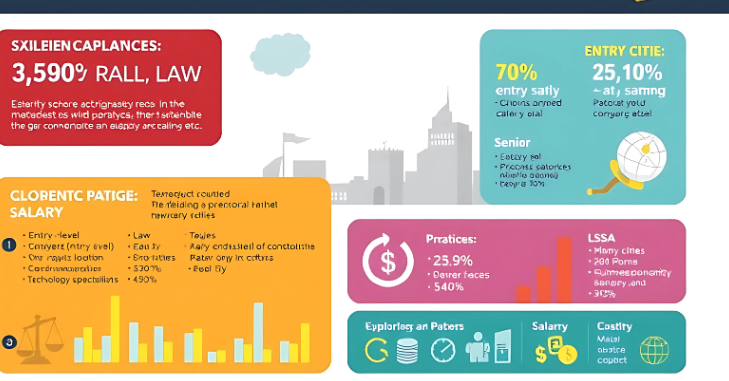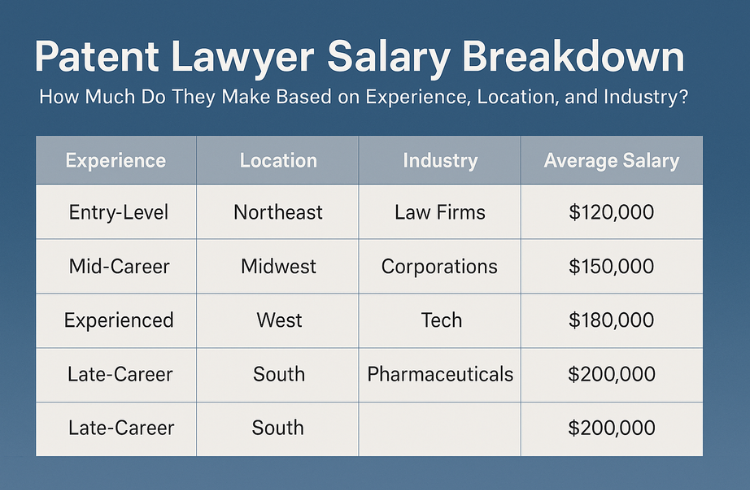Introduction
Patent law is a dynamic and intellectually demanding field that blends legal acumen with technical knowledge. As innovations and intellectual property continue to shape the economy, patent lawyers are in high demand across multiple sectors.
Patent lawyers are critical in protecting intellectual property helping inventors and businesses secure patents for their innovations. As specialists in a niche area of law, their salaries can vary significantly based on various factors, including experience, geographical location, and the industry in which they work.
If you’re considering a career in this niche, one of the most pressing questions is: how much do patent lawyers make? This guide explores the patent lawyer salary breakdown based on key factors like experience level, geographic location, and industry.
| Category | Details |
| Average Base Salary | $120,000 – $250,000 per year |
| Entry-Level Salary | $80,000 – $110,000 |
| Mid-Level Salary | $120,000 – $160,000 |
| Senior-Level Salary | $170,000 – $250,000+ |
| Top Paying Industries | Technology, Pharmaceuticals, Energy, Aerospace |
| Top Paying Locations | California, New York, Massachusetts, Washington, D.C. |
| Private Practice vs In-House | Private: Higher potential bonuses; In-House: More stability, lower ceiling |
| Specialized Patent Areas | Biotech, AI, Medical Devices, Software, Chemical Engineering |
| Bonus/Profit Sharing | $10,000 – $40,000 annually, depending on performance and firm structure |
| Educational Requirements | JD degree + Technical/Scientific background + USPTO bar license |
Understanding the Role of a Patent Lawyer
What Is a Patent Lawyer?
A patent lawyer specializes in patent law, advising clients on protecting their inventions and intellectual property. Their work includes drafting patent applications, representing clients in patent disputes, and providing legal counsel on patent strategy.
Key Responsibilities
Patent lawyers are responsible for:
- Conducting patent searches to assess the viability of an invention.
- Drafting and filing patent applications with the United States Patent and Trademark Office (USPTO).
- Advising clients on patent infringement issues.
- Representing clients in litigation or negotiations related to patents.
- Keeping abreast of changes in patent law and regulations.

Average Patent Lawyer Salary
The average Salary for a patent lawyer in the United States typically ranges between $120,000 to $250,000 annually. According to the U.S. Bureau of Labor Statistics and various salary databases:
- Median Salary: $150,000
- Top 10% Earners: $250,000+
- Bottom 10% Earners: Around $90,000
These figures depend significantly on the lawyer’s credentials, experience, and practice setting.
Salary Based on Experience
Entry-Level (0–3 years)
- Range: $90,000 – $120,000
- Entry-level patent lawyers may work under the guidance of senior attorneys and spend more time drafting, researching, and learning procedures.
Mid-Level (4–7 years)
- Range: $130,000 – $180,000
- With a few years of experience, lawyers can manage their clients, handle complex cases, and gain bonus compensation.
Senior-Level (8+ years)
- Range: $180,000 – $250,000+
- Senior attorneys often lead firms or IP departments, manage litigation or global patent portfolios, and receive performance bonuses or equity stakes.

Salary Based on Location
Location plays a significant role in a patent lawyer’s earnings due to the cost of living and regional demand for IP expertise.
High-Paying Cities
- San Francisco, CA: $190,000 – $250,000
- New York, NY: $180,000 – $240,000
- Boston, MA: $175,000 – $230,000
- Washington, DC: $170,000 – $220,000
Moderate-Paying Cities
- Austin, TX: $140,000 – $180,000
- Denver, CO: $135,000 – $175,000
- Seattle, WA: $150,000 – $190,000
Lower-Paying Areas
- Midwest or Southern states (e.g., Ohio, Alabama): $100,000 – $140,000
Education and Credential Influence
A technical degree, such as engineering or biology, and passing the USPTO Patent Bar Exam significantly enhance a patent lawyer’s earning potential. Additional value can be added through obtaining a Juris Doctor (JD) from a top-tier law school, holding dual degrees (JD combined with a PhD), and having published work or experience in intellectual property litigation.
These qualifications elevate a lawyer’s expertise and make them more competitive in the job market, further increasing their salary prospects.

Salary Based on Industry
Law Firms
- Large Firms (Am Law 100): $180,000 – $250,000+
- Mid-Size Firms: $140,000 – $200,000
- Small Firms: $90,000 – $150,000
In-House Counsel
- Tech & Pharma Companies: $160,000 – $220,000
- Manufacturing Firms: $130,000 – $180,000
Government & Academia
- USPTO or Federal Roles: $100,000 – $140,000
- University IP Offices: $90,000 – $130,000
Startups
- Cash Compensation: $90,000 – $150,000
- Equity/Bonuses: Can exceed $50,000 if the company performs well

Bonus Compensation & Benefits
Most patent lawyers enjoy substantial perks and bonuses that enhance their overall compensation. These include signing bonuses at major firms, annual performance bonuses ranging from 5% to 30% of their Salary, and opportunities for equity or profit-sharing in startups and partnerships.
Additionally, they typically receive benefits such as 401(k) matching, health insurance, and paid continuing legal education (CLE) courses, making their overall compensation package attractive.
Career Advancement Opportunities
- Partner at a Law Firm: Up to $400,000+
- Chief IP Counsel at a Corporation: $250,000 – $500,000+
- Independent IP Consultant: Flexible income based on project volume
Challenges That Affect Salary Growth
- High competition in saturated markets
- Long billable hour requirements in law firms
- Cost of continuous education and licensing
- Geographic limitations

Emerging Trends Impacting Patent Lawyer Salaries
In recent years, the rise of emerging technologies such as artificial intelligence, biotechnology, renewable energy, and advanced software has created new opportunities for patent lawyers. Specialists who understand these cutting-edge fields are in high demand, often commanding salaries above industry averages.
Additionally, globalization of intellectual property rights has expanded the need for lawyers skilled in international patent law, including navigating treaties, cross-border disputes, and multi-jurisdiction filings. Firms increasingly offer premium compensation for attorneys who can manage complex portfolios across multiple countries or advise startups on global patent strategy.
How to Maximize Your Earnings
Build a Niche Expertise
Focusing on specific technologies like AI, biotech, or software can help you command a premium salary.
Stay Updated on IP Law Changes
Frequent changes in patent law and international treaties make continuing education essential.
Network & Join IP Organizations
Groups like AIPLA (American Intellectual Property Law Association) offer invaluable resources, mentorship, and job opportunities.
Table: Salary Overview by Key Factors
| Factor | Salary Range | Notes |
| Entry-Level | $90,000 – $120,000 | Junior associate roles or in-house junior positions |
| Mid-Level | $130,000 – $180,000 | Increased responsibility and case management |
| Senior-Level | $180,000 – $250,000+ | May include bonuses or equity stake |
| San Francisco, CA | $190,000 – $250,000 | Highest salaries due to tech sector presence |
| Law Firms (Big) | $180,000 – $250,000+ | Especially in IP boutiques or major corporate firms |
| In-House Counsel | $160,000 – $220,000 | Depends on company size and industry |
| Government Roles | $100,000 – $140,000 | Lower but stable Salary with benefits |

Conclusion
The Salary of a patent lawyer varies considerably based on a combination of experience, geographic location, industry, and credentials. Whether you’re a student eyeing law school or a seasoned attorney considering a shift to IP law, understanding the detailed salary breakdown can help you chart a more informed and rewarding career path.
As demand for innovation protection continues to rise, the field of patent law offers not only intellectual challenge but also financial stability and growth potential.
Apart from that, if you are interested to know about “Understanding the Intricacies of Personal Injury Law” then visit our “Law” category.
FAQs
Published work and experience in intellectual property litigation can add considerable value to a patent lawyer’s resume, making them more competitive and potentially leading to higher salaries.
Yes, holding dual degrees, such as a JD combined with a PhD, can significantly enhance a patent lawyer’s earning potential and marketability.
To become a patent lawyer, one must have a technical degree (e.g., in engineering or biology), complete a Juris Doctor (JD) degree, and pass the USPTO Patent Bar Exam.
Industries such as technology, pharmaceuticals, and biotechnology typically offer the highest salaries due to the complexity and value of the intellectual property involved.



